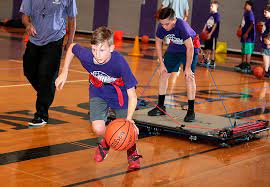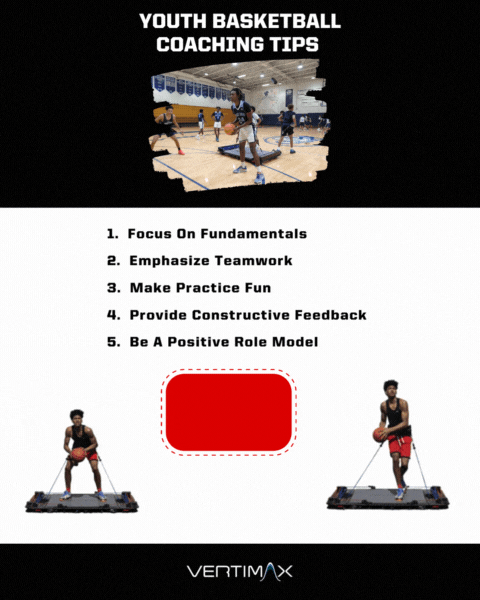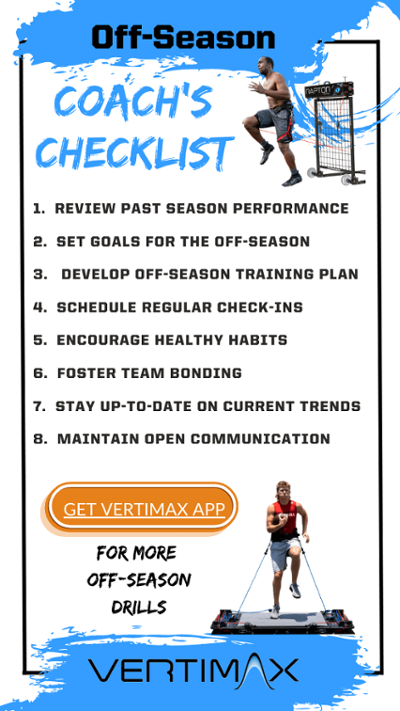Coaching a youth basketball team is a rewarding experience that requires patience, leadership, and knowledge of the game. As a coach, you have a profound responsibility to shape the lives of young athletes both on and off the court.
As coaches, mentors, and role models, we hold the power to make a lasting impact on their development, both on and off the field. Basketball is a great team sport that not only improves physical fitness but also teaches valuable life skills. Coaching a youth basketball team can be a rewarding experience, but it can also be challenging. It requires a combination of patience, leadership, and knowledge of the game.
Teaching fundamental skills such as dribbling, passing, shooting, and defensive footwork is crucial for success. It is also essential to emphasize teamwork, make practice fun, and provide constructive feedback to foster a positive and productive learning environment.
Remember, as a coach, you play a significant role in the development of your players, and with the right approach, you can help them reach their full potential.
In today's world, coaches face a unique set of challenges. One major challenge is the increasing pressure and expectations placed on young athletes. With the rise of competitive sports culture, the desire to excel and secure scholarships or professional opportunities can create immense pressure on youth athletes, leading to stress and burnout. Coaches must strike a delicate balance between fostering healthy competition and ensuring the well-being of their players.
Furthermore, coaching a diverse group of young basketball players requires coaches to be adaptable and inclusive, catering to different skill levels, learning styles, and backgrounds. Building trust and rapport with each player is crucial to help them overcome challenges and reach their full potential.
Here are some tips for coaching youth basketball teams that will help you create a positive and productive learning environment for your players.
5 Tips For Coaching A Youth Basketball Team
1. Focus on Fundamentals
One of the most important aspects of coaching youth basketball teams is teaching fundamental skills, such as dribbling, passing, shooting, and defensive footwork. It’s important to break down each skill into its basic components and practice them repeatedly until they become second nature to your players.
-
Dribbling Drills
Two ball dribbling drills are a must to incorporate into your practices. This video showcases a series that will insure improvement in your players’ abilities.
Also, checkout these 3 Basketball Dribbling Drills to help with ball handling skills.
-
Passing Drills
Passing may seem like a tedious focus, but it can make a difference in your team’s success. Here is a great video showing a basic but valuable drill to add to the mix:
-
Shooting Drills
Can’t win games without making baskets. Taking shots and getting in reps is a must. Here is a fun and competitive shooting drill for practice.
Continue to improve your athlete’s shooting skills by incorporating these Basketball Shooting Drills And Exercises To Improve Shooting Average.
-
Defensive Drills
Defense wins championships. Make sure to add this drill to improve defensive footwork.
For more great basketball drills, click the button below to get 5 Basketball Training Drills To Drastically Improve Your Game to help improve strength, agility, and prepare an athlete for the mental situations they will encounter in a real game.
2. Emphasize Teamwork
Basketball is a team sport, and teamwork is essential to success. Encourage your players to work together by emphasizing the importance of passing, communicating, and supporting each other on the court. Teach them to celebrate each other’s successes and to support each other through mistakes.
- Passing Circle Drill
One effective teamwork drill for basketball is the "Passing Circle Drill." This drill focuses on improving communication, teamwork, and passing accuracy among teammates. Here's how to execute the drill:
- Form a circle with your team, with each player standing approximately arms-length apart from one another.
- Designate one player to start with the basketball.
- The player with the basketball initiates the drill by passing to any teammate in the circle.
- After making the pass, the player follows the pass and moves to the open spot in the circle.
- The receiving player catches the ball, pivots if necessary, and quickly passes to another teammate in the circle.
- This passing sequence continues in a continuous and rapid manner, with players constantly moving to open spots and making crisp, accurate passes.
- Encourage players to use verbal communication, such as calling out names or signaling for the ball, to enhance teamwork and awareness.
- To make the drill more challenging, introduce variations such as requiring a specific type of pass (e.g., bounce pass, chest pass) or increasing the speed of the passes.
3. Make Practice Fun
Youth basketball players are more likely to stay engaged and motivated if practices are fun and challenging. Incorporate games and drills that simulate game situations, and vary the activities to keep players interested and excited to learn.
Here are some ideas to make basketball practice enjoyable:
- Incorporate Game-Like Drills: Design drills that simulate game situations. Use competitive drills that involve scoring, small-sided games, or timed challenges. This adds excitement and a sense of purpose to the practice session.
- Use Props and Equipment: Introduce various props and equipment to spice up the practice. For example, use agility cones, hurdles, or targets to add a fun and challenging element to drills. Incorporate basketball-related games or activities like knockout, dribble obstacle courses, or shooting contests.
- Music: Playing upbeat music during practice can energize the atmosphere and create a positive vibe. Let players take turns choosing songs to keep them engaged and motivated.
- Skill Challenges and Rewards: Create skill challenges where players compete against each other to achieve specific goals. For example, challenge them to make a certain number of consecutive free throws or complete a dribbling course within a specific time limit. Offer small rewards or incentives for achieving these challenges.
- Variation and Creativity: Keep practices fresh and exciting by introducing new drills, games, or variations of existing ones. Add twists or modifications to familiar drills to keep players on their toes and make them think creatively.
4. Provide Constructive Feedback
Youth basketball players are still developing their skills, and it’s important to provide them with feedback that will help them improve. Focus on positive reinforcement and offer constructive criticism that is specific, actionable, and encourages players to keep working on their weaknesses.
Here are some tips on how to deliver effective and constructive feedback:
- Be Specific and Objective: Focus on specific actions, skills, or behaviors rather than making general statements. Use objective language and provide specific examples to support your feedback. This helps athletes understand what they need to work on and how to improve.
Example: Instead of saying, "You need to work on your shooting," you can say, "I noticed that your shooting form could be improved. Your elbow tends to flare out, which affects your accuracy. Try keeping your elbow tucked in for a more consistent shot."
- Balance Positive and Constructive Feedback: Begin with positive feedback to acknowledge what the athlete is doing well. Then, provide constructive feedback on areas that require improvement. This helps maintain motivation and builds confidence while addressing areas for growth.
Example: "You did a great job on defense today, staying in front of your opponent and contesting shots. One area to focus on is your rebounding. I noticed you could be more aggressive in boxing out and going after the ball."
- Use a Growth Mindset Approach: Frame feedback in a way that emphasizes improvement and growth, rather than focusing solely on mistakes or shortcomings. Encourage athletes to see feedback as an opportunity for learning and development.
Example: "Your passing has improved a lot, and I appreciate your effort. To take it to the next level, let's work on improving your decision-making. Look for open teammates and make quicker, more accurate passes to create better scoring opportunities."
- Offer Solutions and Actionable Steps: Instead of just pointing out areas of improvement, provide athletes with actionable steps they can take to address those areas. Give them specific drills, exercises, or techniques they can practice to enhance their skills.
Example: "To improve your ball handling, I suggest spending extra time on dribbling drills. Try incorporating cone drills or dribbling with your weaker hand for at least 15 minutes each day. This will help you become more confident and comfortable with both hands."
- Be Respectful and Supportive: Maintain a positive and respectful tone when providing feedback. Ensure that athletes understand that your intention is to help them grow and succeed. Offer support and encouragement, along with constructive feedback, to create a safe and trusting environment.
5. Be a Positive Role Model
As a coach, you are not only responsible for teaching basketball skills, but also for modeling positive behaviors and attitudes. Show your players what it means to be a good sport, and encourage them to respect their opponents, officials, and teammates.
Recently, VertiMax conducted interviews with current high school basketball coaches and received feedback through their own experiences on what it takes to be a successful basketball coach. Listen in as we share these 10 Best Coaching Advice From High School Basketball Coaches.
Throughout this article, we have explored five essential tips for coaching youth basketball that can enhance the coaching experience and maximize the potential of our players. Mastering fundamental skills is crucial for building a strong foundation. Fostering teamwork and communication promotes collaboration and unity on the court. By using positive reinforcement and instilling leadership qualities, you will empower your young basketball players.
By implementing these tips, coaches can create a transformative experience for their youth basketball teams. We can inspire, motivate, and empower our young athletes to become exceptional competitors and individuals of integrity, resilience, and leadership.
Ready to take your coaching to the next level? Discover the power of VertiMax, the ultimate training tool for youth basketball. Elevate your players' skills, boost their athleticism, and unlock their full potential. Don't miss out on the opportunity to revolutionize your coaching techniques. Visit VertiMax.com now and start transforming your youth basketball team today!






.png?width=110&name=Listing%20Image-basketball%20ladder%20drill%20%20(350%20x%20350%20px).png)













